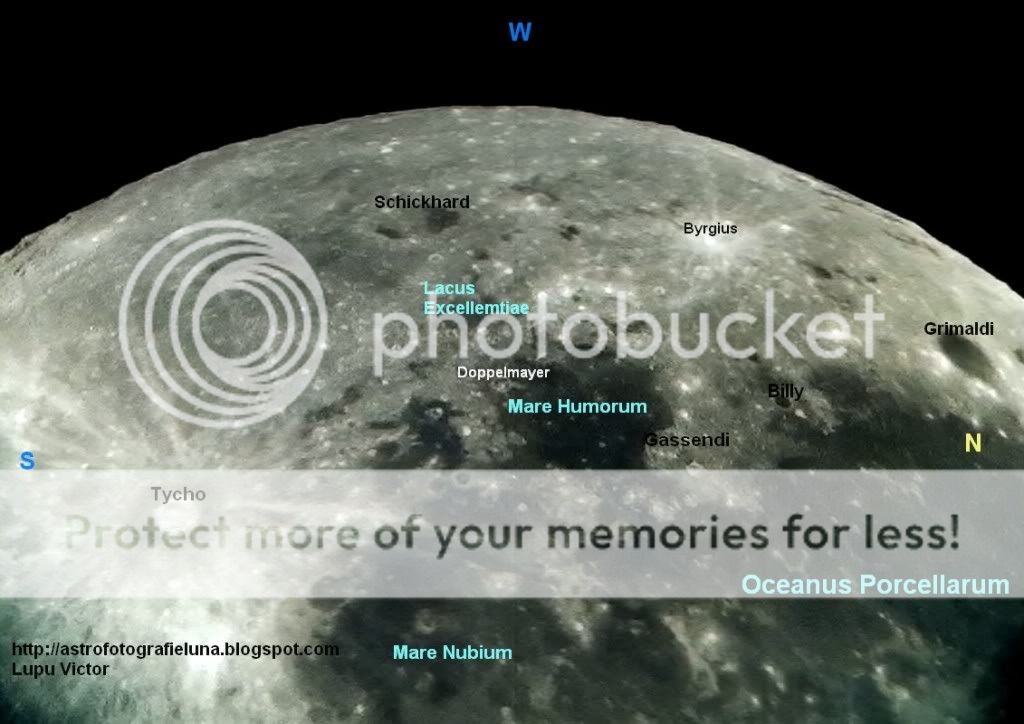Photo made in November 2010
West of the Moon seen from Earth, we see always the same for the Moon always keeps the same face toward us and never turns his back. It is a large area occupied by Oceanus Procellarum. To the west of the mare, distinct craters are: Grimaldi, who is seen as a dark spot in comparison with the surrounding land, when it is full Moon, Schickard, Gassendi, located on the Mare Humorum, and Byrgius that despite being a relatively small crater, 87 km, shows white rays starting at it, for distances over 400 km.
Oceanus Procellarum is the most extensive and interesting feature of the western part of the Moon. This large area covers almost all the West. On the west, mountains of the Moon are not large.
Results of the links may not have the title features you are looking for, but in the content of those articles, those features are presented.
Craters of the Moon's western area.
Agatharchides
Angstrom
Aristarchus
Aston
Bailly
Bessarion
Bettinus
Billy
Brayley
Briggs
Bullialdus
Byrgius
Campanus
Capuanus
Cardanus
Cavelerius
Cavendish
Cichus
Clausius
Cruger
Damoiseau
Damey
Darwin
De Vico
Diophantus
Doppelmayer
Drebbel
Dunthome
Eddington
Encke
Euclides
Euler
Flamsteed
Fontana
Fourier
Fra Mauro
Freres
Galilaei
Gasparis
Gassendi
Grimaldi
Hainzel
Hansteen
Herigonius
Henry
Hermann
Herodotus
Hevelius
Hippalus
Inghirami
Kepler
Kies
Kircher
Konig
Krafft
Krieger
Kuiper
Kunowsky
Lacroix
Lagrange
Lamarck
Lansberg
Lavoisier
Lee
Lepaute
Letrone
Liebig
Lohrmann
Lubiniezky
Maestlin
Marius
Mee
Mercator
Mersenius
Milichius
Noggerath
Nasmyth
Nielsen
Palmieri
Phocylides
Piazzi
Prinz
Ramsden
Reiner Gamma
Reinhold
Riccioli
Rocca
Russell
Schiaparelli
Schickard
Seleucus
Sirsalis
Struve
T. Mayer
Ulugbek
Vaisala
Vieta
Vitello
Wargentin
Wichmann
Withrop
Wollaston
Zucchius
Zupus
Seas of the Moon's western area.
Mare Cognitum
Mare Humorum
Mare Imbrium
Mare Insularum
Oceanus Procellarum
Mountains of the Moon's western area.
Montes Agricola
Montes Harbinger
Montes Riphaeus
Mons Delisle
Mons Vinogradov
Other forms of relief in the west area of the Moon.
Palus Epidemiarum
Lacus Aestatis
Lacus Excellentiae
Vallis Inghirami
Vallis Schroteri
Space missions on the east side of the Moon.
Luna 7 (1965) Soviet Union- because of loss of control of altitude, crashed on the moon with a high velocity.
Luna 8 (1965) Soviet Union- collapsed on the lunar surface due to a faulty parachute.
Luna 9 (1966) Soviet Union- successfully sent nine images of the lunar surface, including five panoramas.
Luna 13 (1966) Soviet Union- Soviet spacecraft was the second that has successfully reached the lunar surface.
Surveyor 1 (1966) USA- was the first U.S. spacecraft that managed to land safely on the Moon.
Surveyor 2 (1966) USA- during stability maneuver, an engine has not ignited, and crashed on the Moon.
Apollo 12 USA- (EVA). On November 19, 1969, Apollo 12 crew performed a landing on the lunar surface landing a few hundred meters from the crater Surveyor. The main purpose of the mission was to collect pieces of the Surveyor III ship that landed in the crater, 31 months earlier.
SMART-1 (2006) - Europe. After exhaustion of fuel, SMART-1 was deliberately crashed into the lunar surface near the Lacus Excelentiae. The impact was visible from Earth, in North and South America.
Video: Victor Lupu
Optics: CelestronC8 "-Newtonian telescope, plossl20mm, 2x Barlow
Mount: CG5 (EQ5)
Device: SonyCX105 at 7x optical zoom
Total Magnification: 700x
Filter: no
Date: 20/07/2011
Location: Baia Mare, Romania
Processing and editing: Sony Vegas 10
To see the photographic map of the west area of the moon, view: Photographic map of the Moon: West Zone. Lunar Atlas.
Sunday, 19 February 2012
IMAGES AND VIDEOS
About me
(8)
Astronomical Phylosophy
(5)
Astronomy Labels
(1)
Astronomy terms
(5)
Craters-Reinhold and Lansberg
(2)
Craters-Santbech
(5)
DSLR Hyperion pictures
(4)
DSLR astronomy pictures
(4)
DSLR telescope pictures
(21)
Occultations
(5)
Rima Ariadaeus
(4)
Rupes Altai
(10)
The colours of the Moon
(7)
Things about the Moon
(9)
Weird sightings
(8)




 Sunday, February 19, 2012
Sunday, February 19, 2012
 Unknown
Unknown


 Posted in:
Posted in: 


0 comments:
Post a Comment